Finding the right MIDI keyboard can dramatically enhance your music production experience.
Whether you’re crafting beats in a bedroom studio or performing live on stage, the ideal keyboard balances functionality, ease of use, and integration with your digital setup.
This article will help you discover the MIDI keyboard that fits your creative workflow and technical needs perfectly.
Our top pick is the Novation SL MkIII 49 Key for its easy-to-use sequencing and ability to work on professional setups in the studio and live.
Our Recommendations
[affiliatable id=’229616′]
What You Need To Know
Who This is For
This guide helps music creators, from novices to pros, elevate their craft with the ideal MIDI controller.
Performance
Our MIDI controller reviews reveal key differences in DAW integration, key count, portability, and control options.
How We Picked
We evaluated MIDI controllers for versatility, keybed quality, user-friendliness, software compatibility, and value, offering both compact and full-sized models.
How We Tested
Our tests in studio and live settings assessed each MIDI controller’s technical prowess, ease of use, and DAW integration.
Best MIDI Keyboards and Controllers For Music Producers 2024
[affiliatable id=’229159′]
The Novation SL MkIII 49 Key MIDI Keyboard & Sequencer excels in blending DAW control and hardware integration, standing out in the MIDI controller market.
Its features include seamless DAW integration, an intuitive step sequencer inherited from the Novation Circuit, and a Scales Mode beneficial for beginners.
With standard MIDI connectivity, it suits various studio setups.
Its efficiency in workflow, tactile control, and clear visual feedback make it superior to competitors like Arturia BeatStep Pro and Native Instruments Komplete keyboards.
The device’s future-proof firmware and 8-track sequencer cater to both studio recording and live performances, appealing to a wide user range, from beginners to professionals, especially those favoring hybrid setups.
[affiliatable id=’229608′]
The Arturia KeyLab Essential 49 MIDI Controller excels in its user-friendly design and seamless software integration, making it a prime choice for both novice and experienced music producers.
It features 49 full-size, velocity-sensitive keys, providing a dynamic and tactile playing experience ideal for studio and live performances.
The controller stands out with its extensive DAW command center, allowing smooth workflow with popular software like Logic and Ableton.
Its integration with Arturia’s V Collection offers access to a vast library of sounds, enhancing its versatility.
While it’s limited to 49 keys and some users report build quality concerns, its functionality and cost-effectiveness make it a highly capable tool for exploring diverse sounds.
[affiliatable id=’229161′]
The Akai MPK Mini Mk3 controller is an excellent choice for music producers and beat makers seeking a balance of portability and functionality.
It features 25 velocity-sensitive keys, 8 backlit drum pads, and 8 assignable knobs, offering versatile control options.
The controller stands out for its improved keybed and responsive pads, making it ideal for expressive playing and live performance.
Despite its compact size, it includes a comprehensive software bundle, enhancing its value.
While its build quality is somewhat less robust and the key range limited, it remains highly suitable for beginners, educators, and those composing on the move, particularly with its strong DAW compatibility and portability.
[affiliatable id=’229610′]
Ideal for the professional studio or serious home setup, this MIDI controller blends innovation with expressive control.
It boasts a semi-weighted Fatar keybed, offering nuanced performance across 49, 61, or 88 keys.
Unique for its polyphonic aftertouch, the keyboard facilitates individual note expression, elevating playability.
Constructed with robust materials, including anodized aluminum, it promises durability and a sleek appearance. Deep software integration, particularly with Native Instruments’ suite, streamlines workflow.
While it lacks drum pads and leans towards the pricier side, its MIDI 2.0 compatibility and forward-thinking design make it a top choice for those prioritizing precision and a seamless hardware-software blend in music production.
[affiliatable id=’229611′]
This MIDI controller is a perfect blend of functionality and user-friendliness, ideal for both budding and seasoned music producers. With 61 full-sized MIDI piano keys, it offers a dynamic playing experience.
The controller includes eight assignable knobs and nine faders, enhancing creative control. Notable features like Smart Chord & Scale Modes and an Arpeggiator add depth to compositions.
Its auto-mapping with popular DAWs streamlines workflows, making it a reliable tool in music production.
Despite some sensitivity in drum pads and a plasticky build, its affordability and portability make it a valuable choice for producers needing a tactile, intuitive MIDI controller with essential features for a wide range of music production needs.
Our Research
Why You Should Trust Us
How We Picked and Tested
Our Pick: Novation SL MK III 49 Key
Runner-Up: Akai MPK Mini Mk3
Arturia KeyLab Essential mk3
Native Instruments Komplete Kontrol S49 Mk3 Keyboard
M Audio Oxygen MKV 61
Other Good MIDI Keyboards Available
Why You Should Trust Us
Daniel Strongin, the author of this guide and founder of SoundShockAudio, is a Pyramind Music Production School alumnus with a rich background in the music production industry.
His expertise stems from his roles as an editor and writer for leading music production websites such as The Pro Audio Files, Envato, and Producer Spot, coupled with his experience in creating top-ranked sample packs for major labels like Audentity Records and Sample Magic.
His work has been featured on prominent platforms like Splice and iZotope, and he has produced viral tracks for esteemed labels, including Liftoff Recordings.
Daniel’s practical experience in music production, both in studio and live settings, ensures that his evaluations of MIDI controllers are grounded in real-world usability and effectiveness.
At SoundShockAudio, he has compiled a vast array of music production tools, affirming his dedication to providing valuable resources to the music creation community.
This guide benefits from his extensive knowledge and hands-on experience, making it a trustworthy resource for finding the best MIDI controllers.
How We Picked and Tested the MIDI Keyboard Controllers
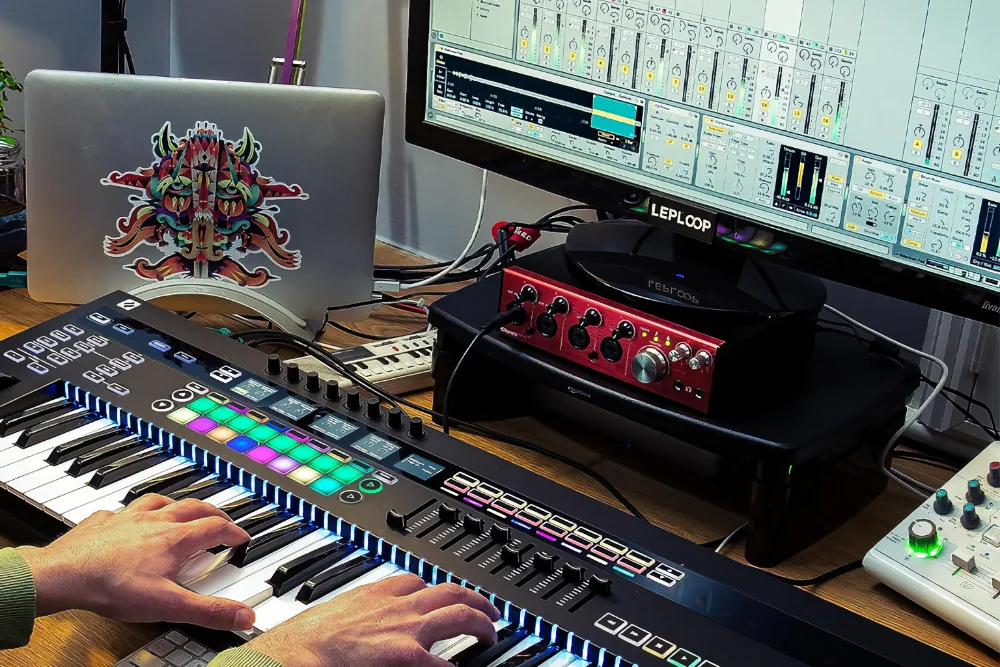
Selection Criteria for MIDI Controllers
When embarking on our journey to find the best MIDI controllers, we considered several critical factors. The keybed quality was paramount, as it directly impacts the playing experience, catering to various styles from classical to electronic music.
We also considered the number of keys that each one has as producers will have various need for the number of keys. We sought controllers that offered seamless integration with popular DAWs, ensuring a smooth creative workflow.
Features and functionality, such as performance pads, knobs, faders, and aftertouch, external MIDI were evaluated for their contribution to the versatility of each controller. Portability was another key aspect, vital for musicians on the move.
We also scrutinized the build quality to ensure longevity, and assessed MIDI and USB connectivity for compatibility with a broad range of devices and setups.
Testing Approach
Our testing was comprehensive, involving real-world use in both studio and live performance settings. Each controller was tested with different DAWs and hardware to evaluate integration and functionality.
We paid close attention to the user-friendliness of the design, assessing how intuitive and accessible the controls and features were.
Special features like arpeggiators and sequencers were thoroughly tested for their utility. We also gathered feedback from a diverse user base – from beginners to seasoned professionals – to get a holistic view of each controller’s performance.
Testing Details
The testing environment varied, from home studios to live performance setups, encompassing a range of musical styles and applications.
We used a variety of DAWs and software to test compatibility and integration. This approach allowed us to understand how each controller performed under different circumstances and for various musical needs.
Performance Analysis
While sound quality is generally not a primary concern for MIDI controllers, we ensured there were no latency issues or compatibility problems.
The ease of use was a significant factor, especially for controllers with a higher learning curve or complex setup processes. We checked the durability under regular use conditions to ensure the controllers could withstand the rigors of frequent use.
Additionally, we assessed the utility of special features, determining whether they offered real value or were simply gimmicks.
Concluding Remarks
Our extensive testing and analysis revealed that the best MIDI controllers strike a balance between functionality, ease of use, and adaptability to various music production needs.
While we have highlighted models that stood out in our testing, we acknowledge that the choice of a MIDI controller is often subjective, influenced by personal preference, specific use cases, and the individual’s workflow.
Our Pick: Novation SL MK III 49 Key
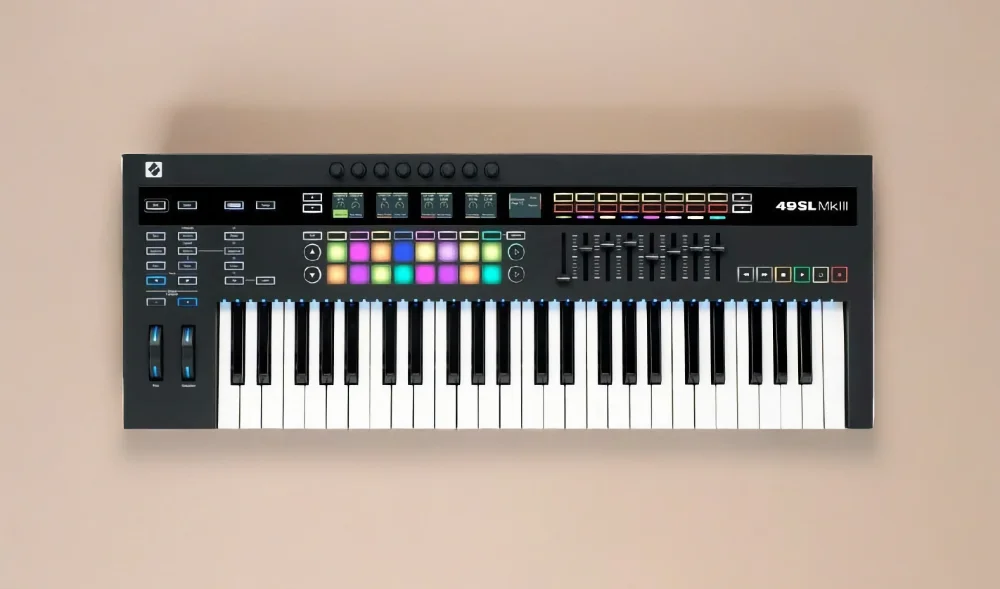
[affiliatable id=’229159′]
In the ever-evolving world of music production, the Novation SL MkIII MIDI Keyboard & Sequencer emerges as a standout choice for one of the best MIDI keyboards.
This device is a marvel of integration, bringing together the best of hardware control and digital audio workstation (DAW) interfacing in a package that speaks both to the seasoned professional and the budding musician.
Key Features That Set It Apart
- Seamless DAW Integration: The SL MkIII excels in melding with your DAW environment, automating controls for knobs, faders, and buttons, making for a smoother creative process.
- Innovative Built-In Sequencer: Borrowing from the Novation Circuit, the sequencer feature allows for intuitive and creative step sequencing.
- Scales Mode for Learners: A unique educational feature, the Scales Mode aids beginners in mastering scales by highlighting in-key notes.
- Universal Connectivity: With a standard MIDI connector, this keyboard ensures broad compatibility, including with devices like the Novation Circuit.
User Experience: In the Studio and Beyond
Professionals in the music industry will find the SL MkIII an asset, particularly when integrating hardware like the Novation Circuit into a DAW setup.
Its color-coded grid and screens provide immediate and clear feedback, enhancing the workflow. The tactile feel of the controls adds to the enjoyment and efficiency, whether you’re sequencing or managing DAW controls.
Comparison with Peers
The Novation SL MkIII differentiates itself from competitors like the Arturia BeatStep Pro and Native Instruments Komplete keyboards through its exceptional combination of sequencing capabilities and DAW control.
The depth and flexibility of its sequencer, the ease of creating hardware templates, and its smooth integration with various DAWs, particularly Ableton Live, mark it as a leader in its field.
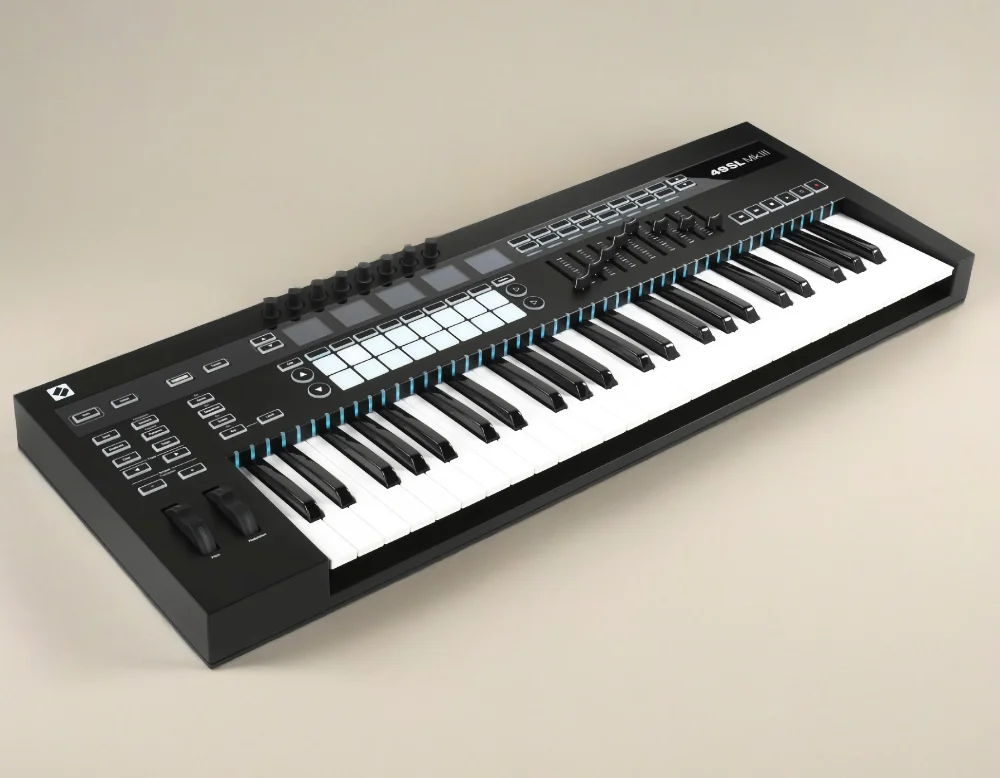
Exclusive Features for Advanced Usage
This advanced MIDI keyboard offers an 8-track sequencer, capable of sophisticated sequencing for both MIDI and CV/Gate.
The forward-thinking nature of its firmware, offering functionalities like pattern viewing and session chaining, confirms its role as a future-proof device.
This MIDI controller is an ideal centerpiece for any studio setup, especially those that blend hardware synthesizers with digital audio workstations.
In Summary: Innovation Meets Practicality
The Novation SL MkIII shines in its ability to harmonize DAW control, hardware integration, and sequencing into a cohesive and user-friendly interface.
It offers a powerful, intuitive experience, suited both for studio recording and live performances.
Who Should Consider the Novation SL MkIII
This MIDI controller is versatile enough to cater to a wide audience. It’s a perfect tool for beginners eager to learn the intricacies of scales and for professionals seeking a robust, central studio controller.
The SL MkIII is particularly beneficial for producers working within a digital framework (‘in the box’) and those who prefer hybrid setups that combine both hardware and software instruments.
Akai MPK Mini Mk3 MIDI Keyboard Controller
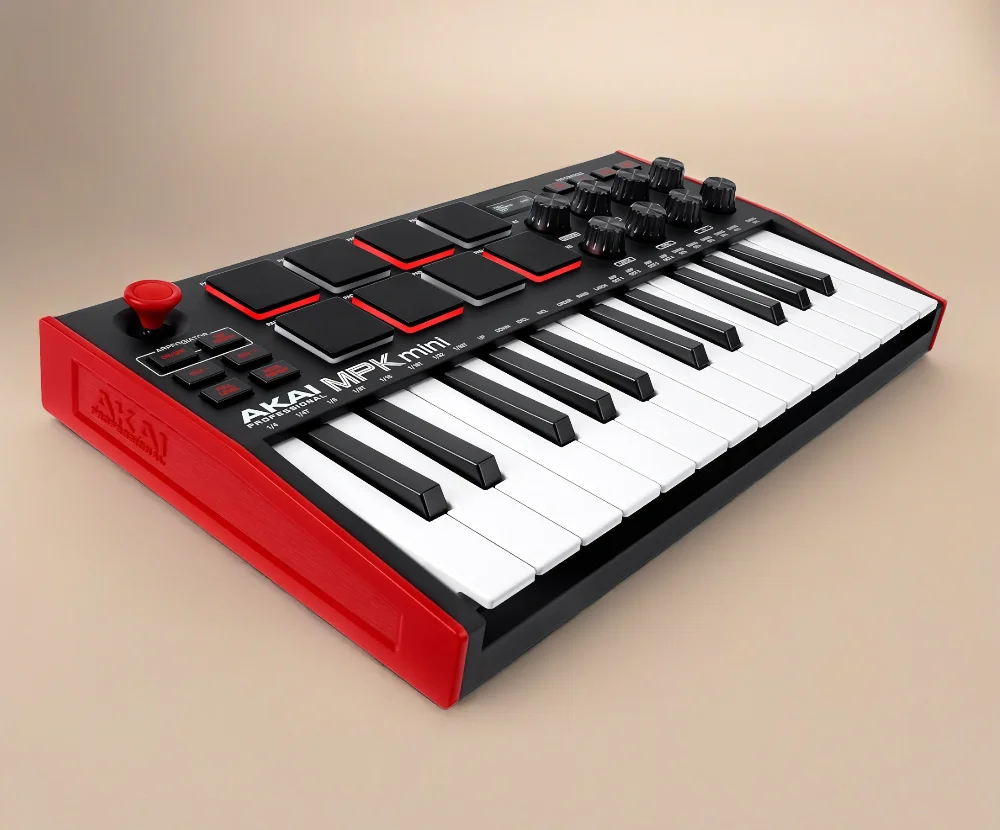
[affiliatable id=’229161′]
The Akai MPK Mini Mk3 MIDI Controller stands out as a compact, feature-rich tool for music producers and beat makers.
It’s a device that caters to the needs of modern digital music production, offering a blend of portability and functionality. Here’s a deep dive into what makes the MPK Mini Mk3 a worthy addition to your studio setup.
Key Features
- Keybed: 25 velocity-sensitive, synth-action keys for expressive playing.
- Control Options: Includes 8 backlit drum pads and 8 assignable knobs for versatile control.
- Compatibility: Offers universal compatibility with various music production apps (DAWs).
- Value for Price: Comes with a comprehensive software package, including MPC Beats, AIR Hybrid, Mini Grand Velvet, and more.
In the Studio: Real-World Experiences
The Akai MPK Mini Mk3’s improved keybed, compared favorably to the Native Instruments M32, provides a tactile and responsive experience, making it a joy to play.
The integration of a 4-way joystick for pitch and modulation adds a creative edge, setting it apart from traditional pitch and modulation wheels.
The 8 MPC-style pads are a standout feature, offering an enhanced feel and responsiveness that’s particularly beneficial for finger drumming. These pads provide the added benefit of accessing two banks, effectively doubling your control capabilities.
The MIDI controller’s 8 assignable knobs, larger and more tactile than its predecessor, offer endless rotation, aligning seamlessly with parameters in your DAW. However, some users may find them a bit loose compared to higher-end models.
The inclusion of an integrated arpeggiator, an OLED display, and convenient connections for a sustain pedal and USB port add to its versatility, although the lack of a MIDI out port is a noticeable omission.
Comparison to Similar Products
When pitted against its competitors, the Akai MPK Mini Mk3 shows strengths and weaknesses.
Its keybed is more favorable than the Novation Launchkey Mini MK3 but doesn’t quite match the premium feel of the Arturia Minilab keybed.
The MPK Mini Mk3’s build, while improved, feels somewhat toy-like compared to the more solid construction of the Minilab and M32. In terms of DAW integration and compatibility, it excels with certain software like Ableton but offers varying levels of control across different DAWs.
Studio Spotlight: Exclusive Features & Applications
The MPK Mini Mk3’s build and design, particularly in its colorful variants, are visually appealing, even though the build quality might not feel as robust as some of its competitors.
The OLED screen, while providing basic information like MIDI CCs and values, doesn’t integrate deeply with DAWs for parameter feedback, leaving room for potential enhancements in future updates.
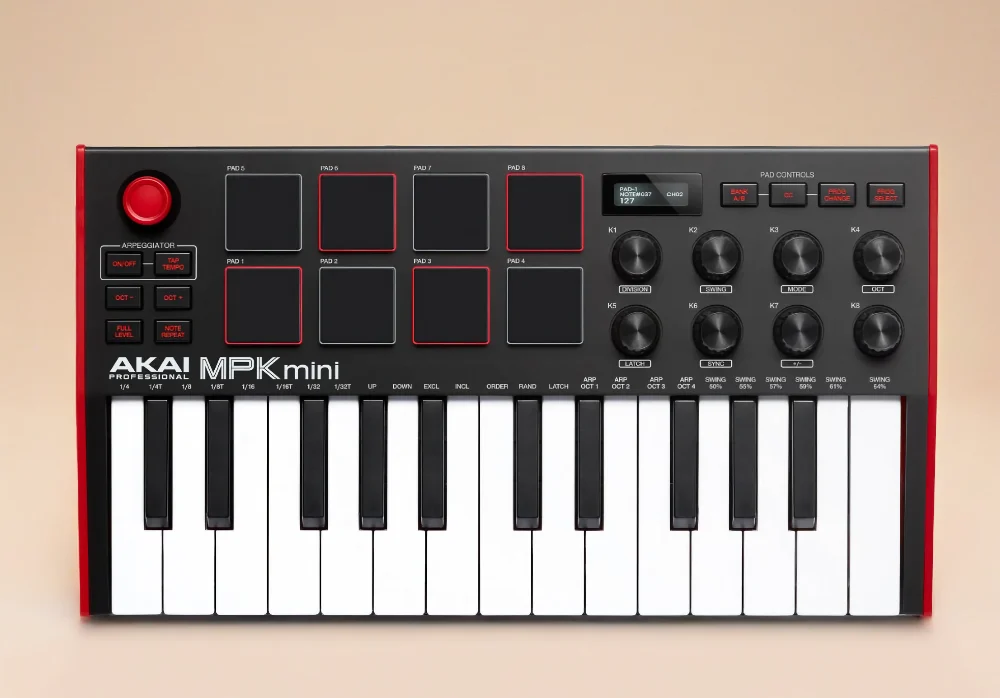
User Experience
Users have reported a significantly improved experience with the MPK Mini Mk3 compared to its predecessors. The keybed is more intentional and responsive, the MPC-style pads are lauded for their superior feel and reliability, and the larger, endless knobs offer a better tactile experience.
This compact MIDI keyboard is particularly well-suited for live performance, thanks to features like the built-in arpeggiator and note repeat. It’s also highly compatible with Akai’s MPC Beats software, making it an excellent choice for users of this platform.
Its portability and simplicity make it ideal for on-the-go compositions and beginner-friendly settings.
Pros and Cons
Pros:
- Improved keybed and pad quality for a responsive, enjoyable playing experience.
- Comprehensive software bundle for immediate music creation.
- Enhanced control options with backlit drum pads and assignable knobs.
- Ideal for portability and live performance features.
Cons
- Limited to 25 keys, which may be restrictive for some users.
- Build quality feels less robust compared to higher-end models.
- Some users may find the knobs to feel slightly cheap and loose.
- The included software could have a steep learning curve for beginners.
The Akai MPK Mini Mk3 is a solid choice for music producers and beat makers who value a mix of portability and functionality in their MIDI controller.
While it excels in areas like pad quality and performance features, it falls slightly short in build quality and comprehensive DAW integration.
It’s particularly recommended for beginner to intermediate users, educators, and those who frequently compose on the go.
Arturia KeyLab Essential mk3 MIDI Controller
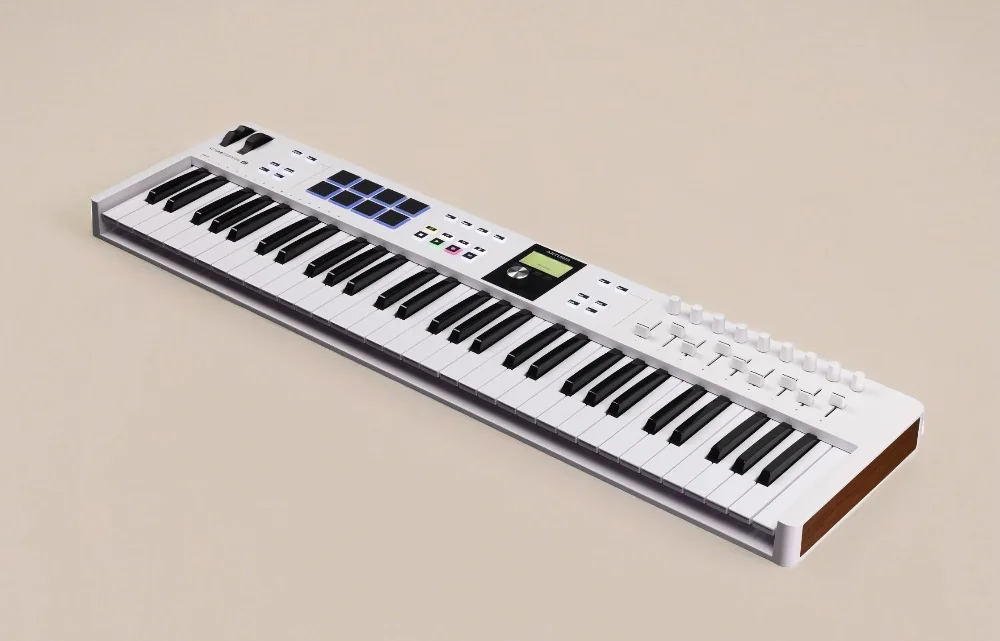
[affiliatable id=’229608′]
The Arturia KeyLab Essential 49 is a standout best MIDI keyboard and controller renowned for its seamless software integration and user-friendly design.
It features 49 full-size, velocity-sensitive keys that offer a tactile and responsive playing experience, making it an ideal choice for both studio recording and live performances.
Keyboard Features
- Responsive Keys: 49 velocity-sensitive synth-action keys deliver a dynamic and expressive playing experience.
- DAW Command Center: Offers efficient control with quick access to transport, metronome, and other essential DAW functions.
- Versatile Control Options: Equipped with 9 encoders, faders, and 8 backlit percussion pads that also function as navigation tools, providing extensive control over music production software.
In the Studio: Real-World Experiences
The KeyLab Essential 49 shines in studio settings with its comprehensive DAW command center, allowing smooth workflow with popular recording software like Logic and Ableton.
The 18 control knobs and sliders are pivotal for real-time manipulation of filters, LFOs, and volume, significantly enhancing the production process.
Its intelligent chord feature aids in swift arrangement creation, making it a favorite among producers.
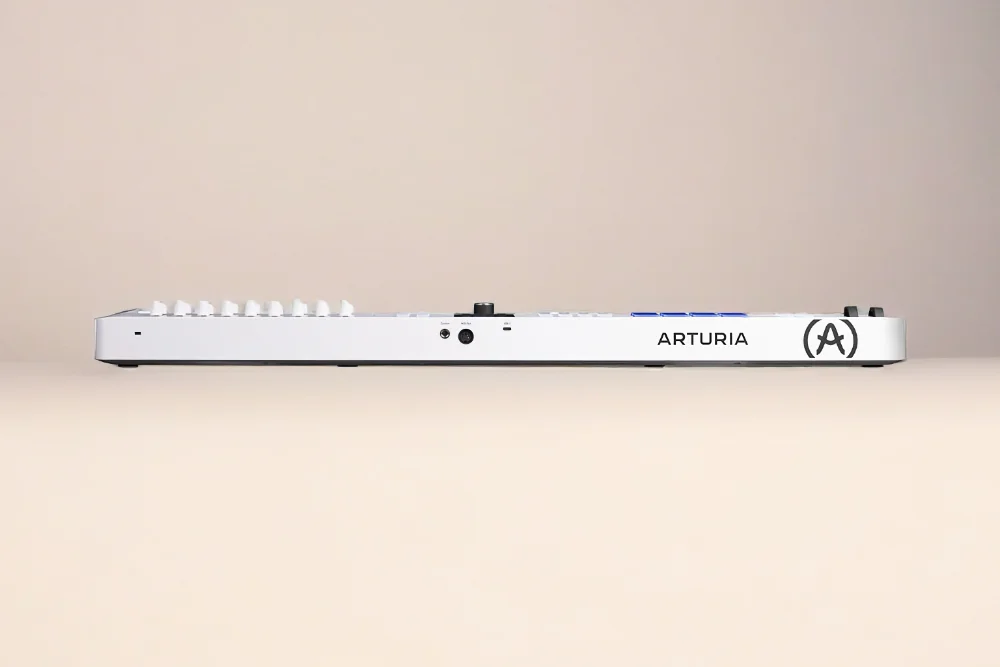
Comparison to Similar Products
Compared to similar products in its range, the KeyLab Essential 49 offers a unique blend of hardware-software integration, standing out with its direct control over Arturia’s V Collection.
This feature puts it ahead of competitors that might offer either more keys or aftertouch but lack in software synergy.
Studio Spotlight: Exclusive Features & Applications
- Arturia Software Integration: Seamlessly integrates with Analog Lab V, providing access to a vast library of iconic synth sounds and classic emulations directly from the keyboard.
- Hybrid Interface: Functions as an effective bridge between tactile hardware control and versatile software, enhancing user interaction and reducing screen time.
Pros and Cons
Pros
- Includes Analog Lab V with 2000 synth sounds, Ableton Live Lite, and UVI Grand Piano model D.
- Over 7000 TAE powered preset sounds from Arturia’s award-winning V Collection.
- Compatible with VST, VST3, AU, and AAX platforms for diverse DAW integration.
Cons
- Limited to 49 keys, which may not suffice for advanced users requiring a broader range.
- Some users report sensitivity issues with knobs and software integration.
- Faders and knobs can feel less robust compared to higher-end models.
Summary
The Arturia KeyLab Essential 49 is a highly capable MIDI controller that balances functionality and cost-effectiveness.
It’s particularly suited for users who appreciate a wide range of sounds and seamless software integration, making it a prime choice for both novice and experienced producers.
Who is This For
This MIDI controller is ideal for music producers and performers seeking a compact, versatile tool that offers hands-on control over their digital audio workstations.
If you need a MIDI keyboard that allows you to explore diverse sounds without investing in multiple hardware synthesizers, this is the MIDI keyboard for you.
Native Instruments Komplete Kontrol S49 Mk3
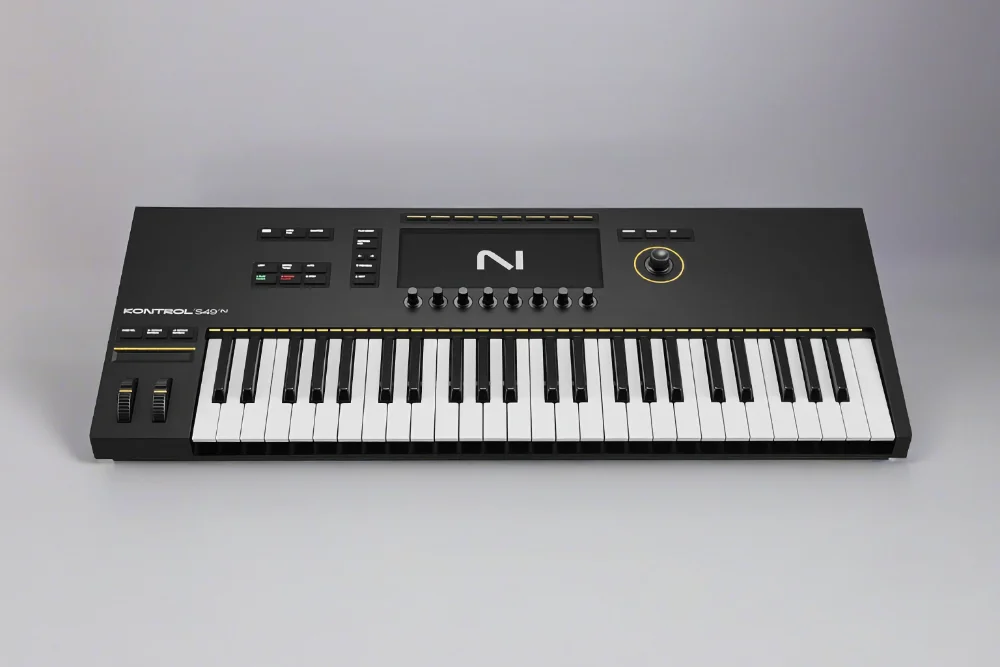
[affiliatable id=’229610′]
Imagine a keyboard that not only listens to your fingers but also speaks the language of your digital aspirations. The Native Instruments Komplete Kontrol S49 MK3 does just that.
It’s not just a keyboard; it’s your digital orchestrator, available in 49, 61, and 88-key versions.
Why It Stands Out: The Polyphonic Prodigy
- Keybed Craftsmanship: Developed with Fatar, this keybed is where your touch meets the heart of sound. It’s responsive, expressive, and, frankly, a joy to play.
- Tech-Forward: With MIDI 2.0 compatibility, it’s like having a future-proof passport to the world of music production.
Real-World Experience: Semi-weighted MIDI Keyboard
When you’re in the flow, the last thing you want is to stumble over a clunky interface.
Thankfully, the Kontrol S49 MK3 is all about smooth sailing. Its keys are semi-weighted – a perfect middle ground for varied playstyles. And the build?
This is one of the keyboard’s best features. It’s robust yet sleek, with a professional look that means business.
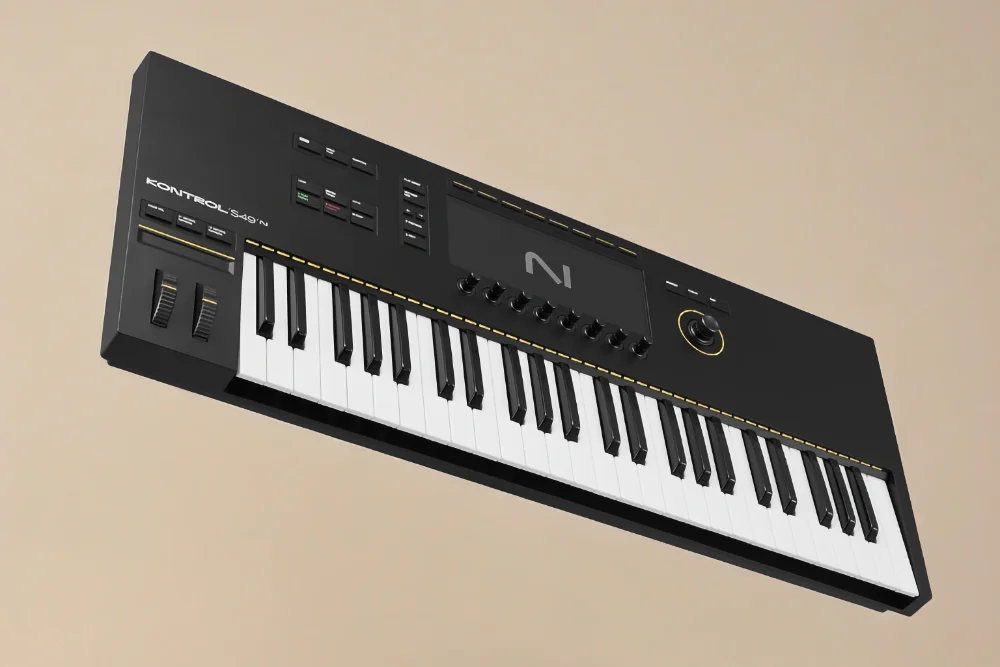
Head-to-Head: A League of Its Own
Compared to others in the ring, the Kontrol S49 MK3 is a heavyweight champion in polyphonic aftertouch. It’s like having an extra set of hands for your musical expressions.
Sure, it’s a bit pricier, but for what it offers, it’s a worthwhile investment.
Spotlight Features: The Studio Maestro
- Deep Software Integration: It syncs beautifully with Native Instruments’ software, making it a breeze to switch sounds and settings.
- Premium Feel: Those anodized aluminum encoders aren’t just for show; they feel as good as they look.
- Forward-Thinking: The onboard computing hints at standalone capabilities down the road – talk about being ahead of the curve!
Pros vs. Cons
Pros
- Expressive polyphonic aftertouch is a game-changer.
- Build quality that withstands the test of time and use.
- Deep integration with music software streamlines your workflow.
Cons
- Lack of drum pads might be a dealbreaker for beat enthusiasts.
- Priced on the higher side – a consideration for those on a budget.
- Currently optimized for Logic Pro, which may limit its universal appeal.
In Summary
In the world of MIDI controllers, the Kontrol S49 MK3 is like a Swiss Army knife – versatile, reliable, and always ready for action. It’s built for those who take their music seriously and want a controller that can keep up with their creativity.
Who Should Buy This
Tailor-made for the professional producer or the dedicated home studio enthusiast, the Kontrol S49 MK3 is for those who value precision, quality, and a seamless blend of hardware and software in their musical journey.
This is truly one of the best MIDI keyboards on the market.
M Audio Oxygen MKV 61
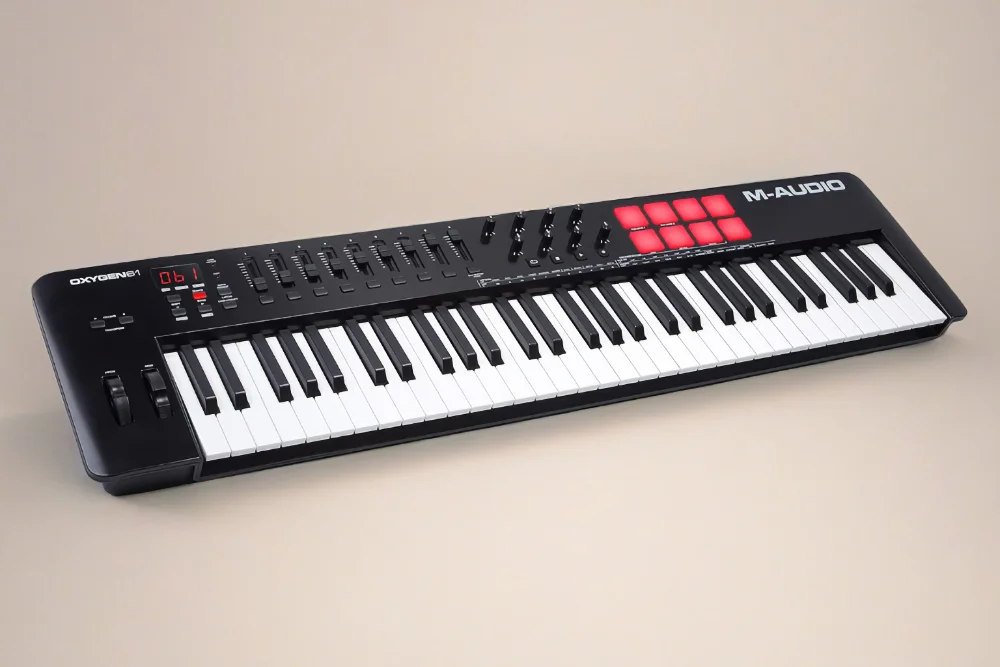
[affiliatable id=’229611′]
The M-Audio Oxygen MKV 61 is not just another MIDI controller. It’s a creative partner that blends seamless functionality with a user-friendly interface.
Tailored for both beginners and seasoned producers, this controller offers 61 full-sized MIDI piano keys, providing a tangible, responsive playing experience that’s hard to find at this price point.
In-Depth Feature Analysis
- Key Count and Type: You get 61 responsive, full-sized keys, a rarity in controllers that are often dominated by mini keys or semi-weighted alternatives.
- Control at Your Fingertips: With eight assignable knobs and nine faders, tweaking your sound or mixing tracks becomes a tactile and intuitive process.
- Smart Chord & Scale Modes: Ideal for composers who want to focus more on creativity and less on the technicalities of music theory.
- Arpeggiator Functionality: This feature is a game-changer, effortlessly adding complexity and depth to your compositions.
A Personal Studio Experience
From personal usage, the M-Audio Oxygen MKV 61 stands out for its straightforward integration with DAWs like FL Studio and Ableton Live, making it a reliable tool in any music production setup.
The full-sized keys are a joy to play, even if they lean towards the plastic side. The Smart Chord and arpeggiator functions invite musical exploration, perfect for when you’re feeling creatively adventurous.
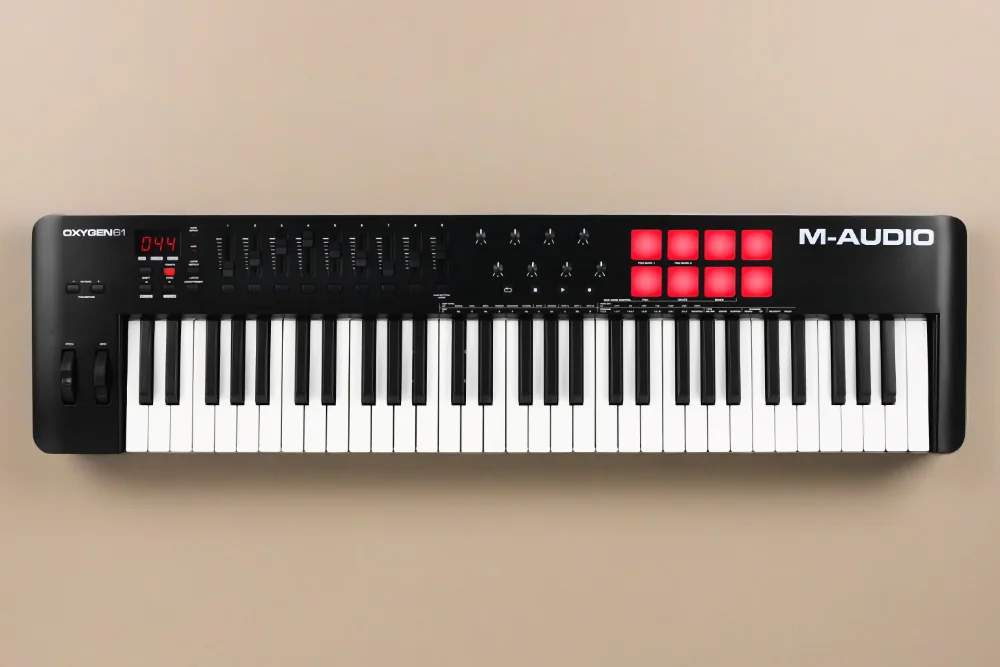
Compared to the Crowd
In the sea of MIDI controllers, the Oxygen MKV 61 distinguishes itself with its full-sized keys and affordability.
It might not boast the semi-weighted keys and aftertouch of its Pro sibling, but its simplicity and portability make it a favorite for a diverse range of musicians.
Special Features for Special Creations Where the Oxygen MKV 61 really shines is in situations that demand intuitive control.
Whether you’re adjusting levels live or mixing tracks in a compact studio space, this controller delivers. It’s also versatile across various DAWs, making it a solid choice for a wide spectrum of production styles.
Pros and Cons
Pros
- Comes with a comprehensive software package, enhancing creative possibilities.
- Auto-mapping for DAWs, a time-saver for busy producers.
- Priced affordably, offering significant bang for your buck.
- Lightweight and portable, perfect for on-the-go music creation.
Cons
- Compatibility quirks with some DAWs.
- Sensitive drum pads that might require a gentler touch.
- Construction feels a bit on the cheaper side, potentially impacting long-term durability.
Summary: The Right Tool for the Right Musician
The M-Audio Oxygen MKV 61 is a well-rounded MIDI controller that hits a sweet spot between functionality and user-friendliness.
Its full-sized keys, diverse control options, and smooth integration with various DAWs make it an attractive option for a wide audience, from bedroom producers to mobile musicians.
Who Should Buy This?
If you’re stepping into the world of music production or are an intermediate producer seeking a cost-effective, feature-rich MIDI controller, the Oxygen MKV 61 is a perfect match.
It’s especially fitting for those who value the feel of full-sized keys and require a versatile tool that won’t break the bank.
Other Good MIDI Keyboards Available
While exploring the MIDI controller landscape, we came across the Nektar Impact LX88+, a notable contender with its 88 semi-weighted keys, offering a piano-like playing experience. Ideal for those who value a natural feel in their keyboard, its comprehensive MIDI functionality and keyboard features are impressive.
However, the LX88+ falls short in portability, and its responsiveness might not match the expectations of those accustomed to high-end MIDI controllers.
The Novation 61SL Mk3 caught our attention with its seamless integration with Ableton Live and an 8-track sequencer that offers a high degree of control. This controller is a powerhouse for those who toggle between software and hardware, but its price tag and complexity might be daunting for beginners or budget-conscious users.
M-Audio’s Hammer 88 Pro presents an intriguing option with its 88 weighted hammer action keys, offering an authentic piano feel. It comes with a substantial software package, including MPC Beats and Ableton Live Lite, but some users have reported concerns about its build quality. It’s a significant investment, particularly for those new to music production.
Arturia’s KeyLab 61 Mk2 stands out in our lineup with its semi-weighted keys and aftertouch capability, catering to producers who demand both responsiveness and flexibility. Its integration with Arturia’s V Collection software is a major draw, though its focus on Arturia’s ecosystem might limit its appeal to users of other software. The build quality is top-notch, but its price may stretch the budget for some.
Each of these MIDI controllers, while not topping our list, offers unique features and potential value for specific music production requirements. From the piano-like experience of the Nektar Impact LX88+ to the advanced control capabilities of the Novation 61SL Mk3, the authentic piano feel of the M-Audio’s Hammer 88 Pro, and the versatile and expressive Arturia’s KeyLab 61 Mk2, there’s a range of options to suit different needs and preferences in the vast world of music production.
Looking for free music production tools like VST plugins and sample Packs? SoundShockAudio has the largest collection of free music production downloads on the web that you can start using right now!
FAQs
What features should I look for when choosing a MIDI keyboard?
In your quest to select the best MIDI keyboard, prioritize features like weighted keys for a natural piano feel, velocity sensitivity for dynamic control, and pitch and mod wheels for expressive playing. The best MIDI keyboards available often include USB MIDI for seamless computer connectivity and a variety of virtual instrument control options. A MIDI control surface with touch strips and additional knobs can also enhance your creative potential.
Are all MIDI keyboards compatible with different music production software?
Most MIDI keyboards, particularly the best midi keyboards and controllers, are versatile enough to work with various music production software. They usually feature USB MIDI connectivity, making them ideal for popular DAWs like Logic Pro X. However, it’s always wise to check the list of the best MIDI keyboards for specific software compatibility, especially if you’re looking for dedicated MIDI control features.
Can I use a MIDI keyboard without a computer or laptop?
While a MIDI keyboard controller typically needs a computer, some of the latest MIDI keyboards come equipped with MIDI and CV capabilities, allowing direct connection to external gear. These keyboards or controllers might also feature both USB and traditional five-pin MIDI outputs for broader connectivity options.
Can I connect my MIDI keyboard to other external devices like synthesizers or drum machines?
Yes, many of the best MIDI keyboards and controllers are designed for easy integration with external devices. They often feature both USB and five-pin MIDI outputs, enabling them to send MIDI data to and capture MIDI from devices like synthesizers and drum machines. Keyboards with semi-weighted or weighted MIDI keys are particularly versatile for various setups.
What are the best MIDI controllers for integration with specific software like FL Studio or Logic Pro X?
When you’re trying to find the best MIDI controller for DAWs like FL Studio or Logic Pro X, look for features that enhance software integration, such as transport controls and velocity-sensitive pads. The best midi keyboards and controllers often come with specialized mappings for these software, making them perfect for both beginners and experienced users looking to add expression to their performance.
Is a portable MIDI controller suitable for professional studio setups?
Certainly! A portable MIDI controller, especially a USB MIDI controller keyboard, can be an excellent choice for professional studios. These devices offer flexibility and portability without compromising on the quality of MIDI control. Some of the best budget MIDI controller options are surprisingly robust and suitable for both studio and live settings.
How do drum pads enhance the functionality of MIDI keyboards?
Drum pads on MIDI keyboards, particularly those found on some of the best MIDI controllers available, provide an intuitive and tactile way to create beats and trigger samples. These velocity-sensitive pads add an extra layer of expressiveness and are key features of this keyboard, making them ideal for rhythmic programming and live performance dynamics.
What are the best MIDI keyboards for finger sensitivity and dynamic sound control?
The Akai Professional MPK Mini MKII, Novation Launchkey Mini MK3, Arturia KeyLab Essential 61, Native Instruments Komplete Kontrol S49 Mk2, and M-Audio Oxygen Pro are known for their exceptional velocity-sensitive keys and dynamic range that offer nuanced control for expressive playing.
How do MIDI keyboards integrate with digital audio workstations (DAWs) accessed via the World Wide Web?
Most modern MIDI keyboards come with USB connectivity that allows them to be easily integrated with DAWs. They often include plug-and-play compatibility and may come with additional software or online resources to enhance their functionality within different production environments.
Can you recommend a versatile MIDI keyboard that is widely compatible across various platforms on the World Wide Web?
The Novation Launchkey series is renowned for its wide compatibility, offering seamless integration with popular DAWs like Ableton Live. It supports both Mac and PC platforms and can also be used in conjunction with various online music-making tools.
What features should I look for in a MIDI keyboard to ensure it has good sound expression capabilities?
Look for features such as aftertouch, weighted or semi-weighted keys, high-quality keybeds, knobs, faders, and pads that offer additional control over your sounds modulation, pitch bend wheels, and assignable controls to tailor your expressiveness when producing music.
Are there any affordable MIDI keyboards that dont compromise on quality suitable for beginners exploring music through the World Wide Web?
Yes! The Alesis V49 or V61 offers great value without sacrificing quality. Affordable yet reliable options like these typically feature full-size velocity-sensitive keys along with some pads and assignable knobs which are ideal for those starting out in music production.
[affiliatable id=’229159′]
Before you go…
Finding the right MIDI keyboard is just the first step to becoming a do it yourself producer.
There is more gear needed to become the best producer you can be.
Read our other articles on finding the best music gear for your studio and music career!

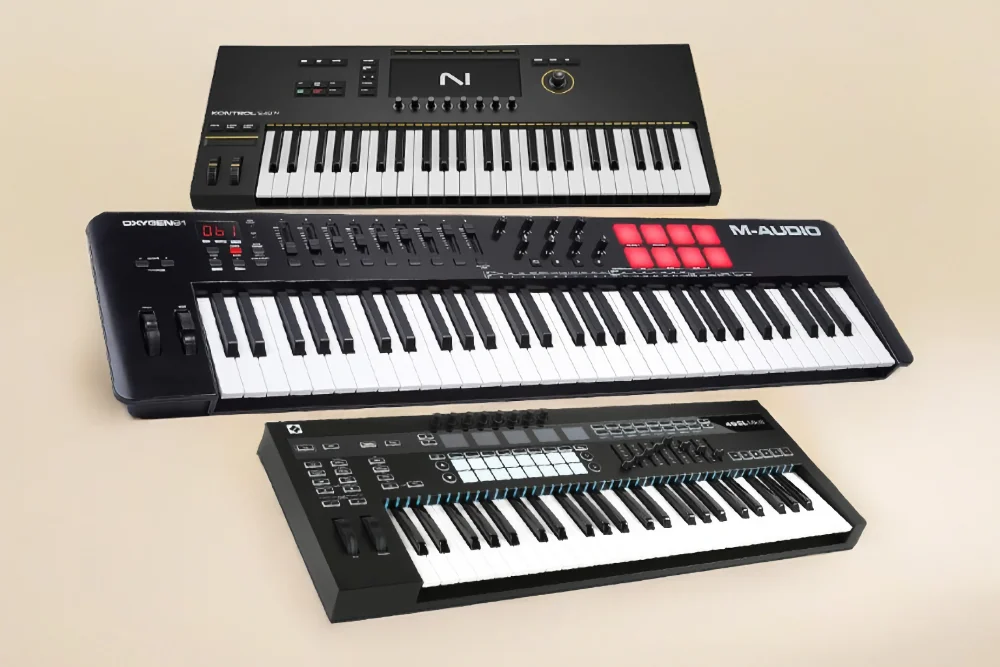


hey daniel, just read the piece about midi keyboards and i gotta ask, is the Novation SL MK III really the best pick for somone just getting into music production? seems a bit high-end for a newbie. thanks for the advice!
TammyG, I think it might be a bit much if you’re just starting. There are definitely more beginner-friendly options out there that won’t break the bank.
I have to disagree with the article’s choice for a runner-up. In my experience, the Akai MPK Mini Mk3, while popular, isn’t the best option out there for serious producers. There are far better models with enhanced capabilities for a little more investment.
I must say, Daniel, wonderful roundup on these options. The spotlight on the Native Instruments Komplete Kontrol S49 Mk3 was spot on. Its integration capabilities are a dream for anyone into vintage sounds and modern production.
lol, why would anyone spend money on an m audio oxygen mkv 61 when you can just use any cheap midi controller and some good vsts? seems like a waste of cash to me.
Is it just me or do MIDI keyboards kinda look like they’re smiling at you sometimes? Especially the Novation ones with all those knobs and sliders, like it’s excited to be played. Just a thought!
been looking into the Akai MPK Mini Mk3, thx for the insights Daniel, but does it have good pads for finger drumming? i read somewhere they’re not that responsive. anyone got experience with it?
BassDrop88, I’ve had the MPK Mini Mk3 for a couple of months and the pads are decent for the price point. Not the best, but definitely usable for beat making on the go.
The pads are okay but if you’re serious about finger drumming, you might want to look at a higher model or even a dedicated pad controller.